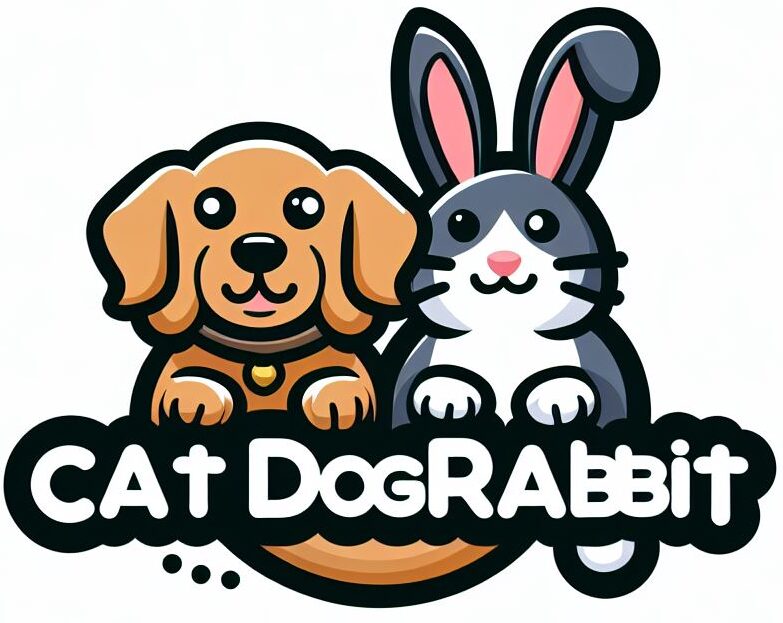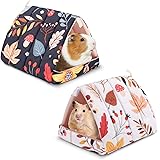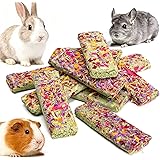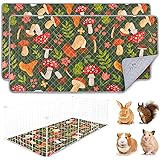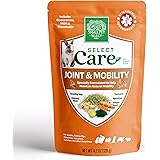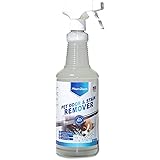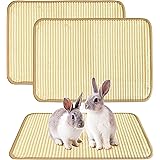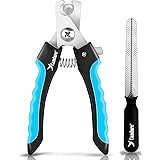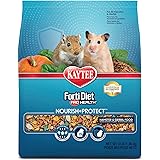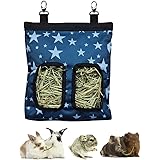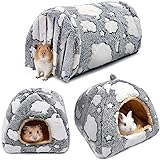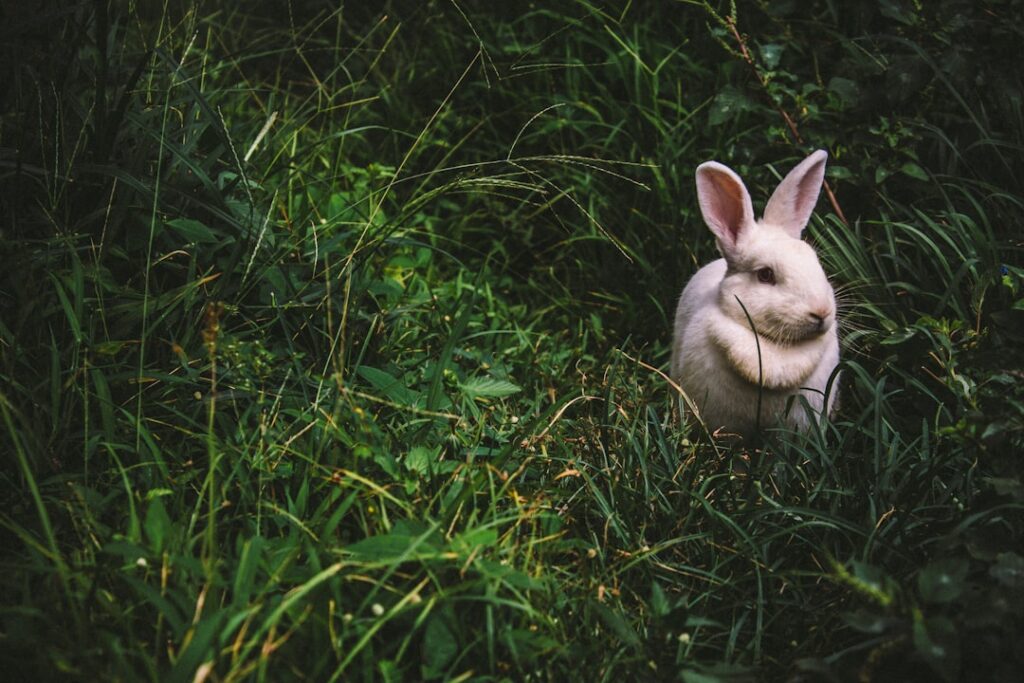
INKNOTE 2 Pcs Guinea Pig Hideout Guinea Pig Tunnel Bed Washable Small cage Accessories for Little Bunny Hamsters Hedgehog Ferret Chinchilla and Other Small Animals,2 Styles, 7.9 Inches
$12.99 (as of 02/08/2026 14:07 GMT +00:00 - More infoProduct prices and availability are accurate as of the date/time indicated and are subject to change. Any price and availability information displayed on [relevant Amazon Site(s), as applicable] at the time of purchase will apply to the purchase of this product.)Abizoo 10pcs Timothy Hay & Alfalfa Chew Toys - Natural Crunchy Treats with Wheat Calendula Rose High Fiber for Teeth Care & Digestive Health for Bunnies, Guinea Pigs, Hamsters, Chinchillas, Gerbils
$13.99 (as of 02/08/2026 14:07 GMT +00:00 - More infoProduct prices and availability are accurate as of the date/time indicated and are subject to change. Any price and availability information displayed on [relevant Amazon Site(s), as applicable] at the time of purchase will apply to the purchase of this product.)2 Pack Washable Guinea Pig Cage Liner, Reusable Guinea Pig Mat, Waterproof Super Absorbent Pee Pads for Small Animals
$22.79 (as of 02/08/2026 14:07 GMT +00:00 - More infoProduct prices and availability are accurate as of the date/time indicated and are subject to change. Any price and availability information displayed on [relevant Amazon Site(s), as applicable] at the time of purchase will apply to the purchase of this product.)Small Pet Select - Select Care Joint Mobility Support Supplement, Natural High Fiber Timothy Hay Based Treats for Rabbits, Guinea Pigs, Hamsters, Other Small Animals, 4.2 oz
$10.99 (as of 02/08/2026 14:07 GMT +00:00 - More infoProduct prices and availability are accurate as of the date/time indicated and are subject to change. Any price and availability information displayed on [relevant Amazon Site(s), as applicable] at the time of purchase will apply to the purchase of this product.)Nature’s Miracle Carpet Shampoo, Deep-Cleaning Pet Stain And Odor Remover, 64 Ounces
$14.42 (as of 02/08/2026 14:07 GMT +00:00 - More infoProduct prices and availability are accurate as of the date/time indicated and are subject to change. Any price and availability information displayed on [relevant Amazon Site(s), as applicable] at the time of purchase will apply to the purchase of this product.)Magic Finish Pet Odor & Stain Remover (32 oz) – Enzyme Carpet Cleaner for Dog & Cat Urine, Vomit, and Messes – Kid & Pet-Friendly Rug & Multisurface Upholstery Deodorizer with Apple Blossom Scent
$14.99 (as of 02/08/2026 14:07 GMT +00:00 - More infoProduct prices and availability are accurate as of the date/time indicated and are subject to change. Any price and availability information displayed on [relevant Amazon Site(s), as applicable] at the time of purchase will apply to the purchase of this product.)52Pcs Rabbit Chew Sticks, Guinea Pig Toys, Natural Timothy Grass Molar Teeth Stick, Mixing Flowers, Roses, Calendula and Forget Me Not, Small Animals Treats
$9.99 (as of 02/08/2026 14:07 GMT +00:00 - More infoProduct prices and availability are accurate as of the date/time indicated and are subject to change. Any price and availability information displayed on [relevant Amazon Site(s), as applicable] at the time of purchase will apply to the purchase of this product.)Oxbow Natural Science Vitamin C Supplement, Vitamin C & High-Fiber Timothy Hay, Guinea Pig Items, Made in the USA, Small Pet Supplies, Recommended by Veterinarians, 4.2 oz
$7.99 (as of 02/08/2026 14:07 GMT +00:00 - More infoProduct prices and availability are accurate as of the date/time indicated and are subject to change. Any price and availability information displayed on [relevant Amazon Site(s), as applicable] at the time of purchase will apply to the purchase of this product.)Nexlythara Rabbit Scratching Pad, Sisal Bunny Scratch Mat for Cages - 2PCS Natural Rabbits Nail Scratcher for Indoor Rabbit Chew Toys & Bedding, 16x12 Inch
$16.99 (as of 02/08/2026 14:07 GMT +00:00 - More infoProduct prices and availability are accurate as of the date/time indicated and are subject to change. Any price and availability information displayed on [relevant Amazon Site(s), as applicable] at the time of purchase will apply to the purchase of this product.)Lop eared bunnies are a popular breed of domestic rabbits known for their distinctive floppy ears. They have been bred for their unique appearance and gentle temperament. Lop eared bunnies originated in France in the 19th century and quickly gained popularity as pets due to their adorable appearance.
Lop eared bunnies are known for their long, droopy ears that hang down on the sides of their heads. This characteristic gives them a cute and endearing look that many people find irresistible. They come in a variety of colors and patterns, making each bunny unique.
One of the reasons why lop eared bunnies are so popular as pets is their friendly and docile nature. They are known to be gentle and affectionate, making them great companions for both children and adults. Lop eared bunnies are also intelligent and can be easily trained, which adds to their appeal as pets.
Key Takeaways
- Lop eared bunnies are adorable due to their floppy ears and cute personalities.
- When choosing a home for your lop eared bunny, consider their size and need for space.
- A balanced diet is crucial for the optimal health of your lop eared bunny.
- Grooming your lop eared bunny regularly helps keep their fur and ears clean and healthy.
- Exercise and playtime are important for keeping your lop eared bunny happy and active.
Choosing the Right Home for Your Lop Eared Bunny: Tips and Considerations
When bringing a lop eared bunny into your home, it’s important to create a safe and comfortable environment for them. There are several factors to consider when choosing the right home for your bunny.
Firstly, you need to decide whether your bunny will live indoors or outdoors. While some people choose to keep their bunnies outdoors in a hutch or a secure enclosure, it is generally recommended to keep lop eared bunnies indoors. Indoor living provides better protection from predators, extreme weather conditions, and potential diseases.
Next, you need to consider the size and setup of your bunny’s cage. Lop eared bunnies need plenty of space to hop around and stretch their legs. The minimum recommended cage size for a lop eared bunny is at least four times their body length. It’s also important to provide them with a comfortable bedding material, such as hay or straw, to keep them warm and cozy.
Bunny-proofing your home is another important consideration. Lop eared bunnies are curious creatures and love to explore their surroundings. It’s important to remove any potential hazards, such as electrical cords, toxic plants, and small objects that they could swallow. You should also secure any areas where your bunny could potentially escape or get stuck.
Feeding Your Lop Eared Bunny: A Balanced Diet for Optimal Health
Proper nutrition is essential for the health and well-being of your lop eared bunny. A balanced diet should consist of hay, fresh vegetables, and high-quality pellets.
Hay is the most important part of a bunny’s diet. It provides essential fiber that helps maintain a healthy digestive system and prevents dental problems. Timothy hay is the most commonly recommended type of hay for lop eared bunnies.
In addition to hay, your bunny should also be fed a variety of fresh vegetables. Leafy greens such as romaine lettuce, spinach, and kale are good options. It’s important to introduce new vegetables gradually to avoid digestive upset.
Pellets should make up a smaller portion of your bunny’s diet. Look for high-quality pellets that are specifically formulated for rabbits. Avoid pellets that contain added sugars or artificial ingredients.
It’s important to avoid feeding your lop eared bunny certain foods that can be harmful to their health. These include chocolate, caffeine, onions, garlic, and foods high in sugar or salt.
The amount and frequency of feeding will depend on the age and size of your bunny. Generally, adult lop eared bunnies should be fed about 1/4 to 1/2 cup of pellets per day, along with unlimited access to hay and fresh vegetables.
Grooming Your Lop Eared Bunny: Keeping Their Fur and Ears Clean and Healthy
| Topic | Description |
|---|---|
| Fur Brushing | Regular brushing helps remove loose fur and prevent matting. |
| Ear Cleaning | Check and clean your bunny’s ears regularly to prevent infections. |
| Nail Trimming | Trim your bunny’s nails every 4-6 weeks to prevent overgrowth and discomfort. |
| Bathing | Bunnies generally do not need baths, but if necessary, use a gentle shampoo and avoid getting water in their ears. |
| Professional Grooming | If you are unable to groom your bunny yourself, consider taking them to a professional groomer. |
Lop eared bunnies have long, dense fur that requires regular grooming to keep it clean and free from mats. Brushing and combing your bunny’s fur is an important part of their grooming routine.
Use a soft brush or comb to gently remove any loose fur and prevent matting. Start at the top of your bunny’s head and work your way down to their tail, being careful not to pull on their fur or ears. Regular brushing will help keep your bunny’s coat clean and reduce the risk of hairballs.
Trimming your bunny’s nails is another important aspect of grooming. Overgrown nails can cause discomfort and make it difficult for your bunny to hop and move around. Use a pair of small animal nail clippers to carefully trim the tips of your bunny’s nails, being careful not to cut too close to the quick.
Cleaning your bunny’s ears is also important to prevent ear infections. Use a damp cloth or cotton ball to gently wipe away any dirt or debris from the inside of their ears. Avoid using cotton swabs, as they can cause injury to your bunny’s delicate ears.
Bathing your lop eared bunny should only be done when necessary, as rabbits are generally clean animals that groom themselves. If your bunny gets dirty or has a soiled bottom, you can use a damp cloth or pet-safe wipes to clean them. Avoid using water unless absolutely necessary, as rabbits are prone to getting chilled and can develop respiratory problems if they get wet.
Exercise and Playtime: Keeping Your Lop Eared Bunny Active and Happy
Lop eared bunnies are active animals that require regular exercise to stay healthy and happy. Providing them with plenty of opportunities for exercise and mental stimulation is essential.
One of the best ways to keep your lop eared bunny active is by providing them with a safe and secure play area. This can be a designated room or a playpen that is free from hazards and escape routes. Make sure the area is bunny-proofed and remove any potential dangers.
Toys and activities are also important for keeping your bunny mentally stimulated. Provide them with a variety of toys, such as chew toys, tunnels, and balls, to keep them entertained. You can also hide treats or food puzzles to encourage foraging behavior.
Bonding with your bunny through playtime is a great way to strengthen your relationship. Spend time interacting with your bunny, whether it’s through gentle petting, playing with toys, or teaching them tricks. Lop eared bunnies are intelligent animals that can be trained to do simple tricks, such as hopping over obstacles or coming when called.
Litter Training Your Lop Eared Bunny: Tips for a Clean and Tidy Home

Litter training your lop eared bunny is an important part of keeping your home clean and tidy. Bunnies are naturally clean animals that can be easily trained to use a litter box.
Start by choosing the right litter box and litter for your bunny. A litter box with low sides is recommended to make it easy for your bunny to hop in and out. Use a litter that is safe for rabbits, such as paper-based or wood pellet litter. Avoid using clumping cat litter, as it can be harmful if ingested.
To train your bunny to use the litter box, place some of their droppings in the litter box to encourage them to use it. Whenever you see your bunny using the litter box, praise them and give them a treat as positive reinforcement.
Clean the litter box regularly to maintain hygiene. Remove any soiled litter and replace it with fresh litter. It’s also important to thoroughly clean the litter box on a regular basis to prevent odors and bacteria buildup.
Accidents and mistakes are bound to happen during the litter training process. If your bunny has an accident outside of the litter box, clean it up using a pet-safe cleaner to remove any odor. Avoid using ammonia-based cleaners, as the smell can attract your bunny to the same spot.
Health and Wellness: Common Health Issues and How to Prevent Them
Lop eared bunnies are generally healthy animals, but they are prone to certain health issues that can be prevented with proper care and attention.
One of the most common health issues in lop eared bunnies is dental problems. Their teeth grow continuously throughout their lives, and if not properly worn down, they can develop sharp points or overgrow, causing pain and difficulty eating. Providing your bunny with plenty of hay and chew toys can help keep their teeth in good condition.
Gastrointestinal stasis, also known as a “gut stasis,” is another common health issue in rabbits. It occurs when the digestive system slows down or stops working, leading to a buildup of gas and toxins. This can be caused by a poor diet, lack of exercise, stress, or other underlying health issues. Feeding your bunny a balanced diet, providing plenty of exercise, and monitoring their overall health can help prevent gut stasis.
Another health issue that lop eared bunnies are prone to is ear infections. Their long, floppy ears can trap moisture and debris, creating an ideal environment for bacteria to grow. Regular ear cleaning and keeping your bunny’s living area clean can help prevent ear infections.
Regular check-ups with a veterinarian are essential for maintaining your bunny’s health and catching any potential health issues early on. A veterinarian who specializes in exotic animals or rabbits will be able to provide the best care for your lop eared bunny.
In case of an emergency, it’s important to have a plan in place for immediate care. Keep a list of emergency veterinary clinics that are experienced in treating rabbits and have the necessary equipment and medications to provide emergency care.
Handling and Socializing Your Lop Eared Bunny: Building a Strong Bond
Lop eared bunnies are social animals that thrive on companionship and interaction. Building a strong bond with your bunny is important for their well-being and happiness.
When handling your lop eared bunny, it’s important to do so safely and comfortably. Support their body with both hands, making sure to support their hindquarters. Avoid picking them up by their ears or scruff, as this can cause injury or discomfort.
Building trust with your bunny takes time and patience. Spend time sitting near your bunny’s enclosure, talking to them in a calm and soothing voice. Offer them treats or favorite foods from your hand to encourage positive associations.
Once your bunny is comfortable with being handled, you can start introducing them to other pets in your household. It’s important to supervise these interactions closely and make sure all animals are comfortable and safe. Some bunnies may not get along with other pets, so it’s important to monitor their interactions and separate them if necessary.
Traveling with Your Lop Eared Bunny: Tips for a Safe and Comfortable Trip
If you need to travel with your lop eared bunny, it’s important to take the necessary precautions to ensure their safety and comfort.
Before traveling, make sure your bunny is accustomed to their carrier. Leave the carrier open in their living area and place treats or favorite toys inside to encourage them to explore it. This will help reduce stress during travel.
Choose a carrier that is well-ventilated, secure, and comfortable for your bunny. Make sure it is large enough for them to move around comfortably but small enough to provide a sense of security. Line the carrier with a soft blanket or towel for added comfort.
During travel, keep the carrier secure and stable to prevent it from tipping over or sliding around. Place the carrier in a quiet and temperature-controlled area of your vehicle. Avoid exposing your bunny to extreme temperatures or direct sunlight.
To help reduce stress during travel, you can cover the carrier with a lightweight blanket or towel. This will create a dark and cozy environment that can help your bunny feel more secure.
If your bunny gets stressed or anxious during travel, you can try using calming techniques such as playing soft music or using a pheromone spray designed for rabbits. Consult with your veterinarian for additional advice on how to keep your bunny calm during travel.
Saying Goodbye: Coping with the Loss of Your Lop Eared Bunny
Losing a beloved pet can be a difficult and emotional experience. When saying goodbye to your lop eared bunny, it’s important to take the time to grieve and honor their memory.
Coping with the loss of a pet is a personal process, and everyone grieves differently. Allow yourself to feel the emotions and give yourself permission to mourn. It’s okay to cry, talk about your feelings, or seek support from friends, family, or support groups.
Creating a memorial for your bunny can be a meaningful way to honor their memory. Planting a tree or flowers in their memory, creating a photo album or scrapbook, or making a donation to an animal charity in their name are all ways to remember and celebrate their life.
If you feel ready, considering adopting another bunny in the future can be a way to fill the void left by your lop eared bunny’s passing. There are many bunnies in shelters and rescue organizations that are in need of loving homes. Before adopting another bunny, make sure you are emotionally ready and able to provide the necessary care and attention.
In conclusion, lop eared bunnies are adorable pets that bring joy and companionship to their owners. Proper care and attention are essential for their health and well-being. By providing a safe and comfortable home, a balanced diet, regular grooming, exercise and playtime, litter training, and regular veterinary care, you can ensure that your lop eared bunny lives a happy and fulfilling life. The bond you build with your bunny will be a source of love and happiness for years to come.
FAQs
What is a lop eared bunny?
A lop eared bunny is a breed of domestic rabbit that has ears that hang down instead of standing upright.
What is the origin of lop eared bunnies?
Lop eared bunnies were first bred in France in the 18th century.
What are the different types of lop eared bunnies?
There are several types of lop eared bunnies, including the English Lop, French Lop, Holland Lop, Mini Lop, and American Fuzzy Lop.
What is the average lifespan of a lop eared bunny?
The average lifespan of a lop eared bunny is 7-10 years.
What is the average size of a lop eared bunny?
The average size of a lop eared bunny varies depending on the breed, but they generally range from small to medium in size.
What is the temperament of a lop eared bunny?
Lop eared bunnies are known for being friendly and social animals. They can make great pets for families with children.
What kind of care do lop eared bunnies require?
Lop eared bunnies require a balanced diet of hay, fresh vegetables, and pellets, as well as regular exercise and grooming. They also need a clean and spacious living area.
Can lop eared bunnies be trained?
Yes, lop eared bunnies can be trained to use a litter box and to come when called. They can also be taught tricks and commands.
Are lop eared bunnies prone to any health issues?
Lop eared bunnies can be prone to dental problems, ear infections, and obesity. It is important to take them to a veterinarian regularly for check-ups and to monitor their health.
